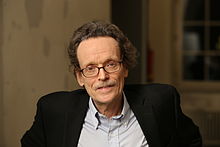Thomas Pogge
| Thomas Pogge | |
|---|---|

Thomas Pogge (2014)
|
|
| Born |
Thomas Winfried Menko Pogge 13 August 1953 |
| Nationality | German |
| Alma mater | Harvard University |
| Notable work | Realizing Rawls |
| Awards | 2013 Gregory Kavka Prize in political philosophy |
| Website | thomaspogge |
| Institutions | Yale University |
|
Main interests
|
John Rawls Immanuel Kant |
|
Influences
|
|
Thomas Winfried Menko Pogge (born 13 August 1953) is a German philosopher and is the Director of the Global Justice Program and Leitner Professor of Philosophy and International Affairs at Yale University. In addition to his Yale appointment, he is the Research Director of the Centre for the Study of the Mind in Nature at the University of Oslo, a Professorial Research Fellow at the Centre for Applied Philosophy and Public Ethics at Charles Sturt University and Professor of Political Philosophy at the University of Central Lancashire's Centre for Professional Ethics. Pogge is also an editor for social and political philosophy for the Stanford Encyclopedia of Philosophy and a member of the Norwegian Academy of Science and Letters.
Pogge received his Ph.D. from Harvard University with a dissertation supervised by John Rawls. Since then, he has published widely on Immanuel Kant and in moral and political philosophy, including various books on Rawls and global justice.
In 2010, Pogge was accused in a high profile sexual harassment case by a recent Yale graduate student. Media coverage of the allegations led several other women to share testimonies of sexual misconduct they had observed from Pogge, and prompted debate regarding integrity standards amongst academics and pervasive sexual harassment in the field of philosophy.
In this book, Thomas Pogge and Aidan Hollis argue in favour of establishing the Health Impact Fund (HIF). The HIF is a new proposal for stimulating research and development of life-saving pharmaceuticals that make substantial reductions in the global burden of disease.
The HIF will provide pharmaceutical companies with a new choice. Pharmaceutical companies can sell a new medicine in the usual manner at patent-protected high prices, or they can choose to register their new medicine with the HIF and sell it globally at the cost of production. If they choose to register their medicine with the HIF, the pharmaceutical company will receive additional payments from the fund that are proportionate to health improvements that are brought about by the registered medicines. The more effective the medicine is in improving global health, the bigger the payout. Because malaria kills millions, the firm that finds and develops a cure can expect a significant return.
...
Wikipedia
